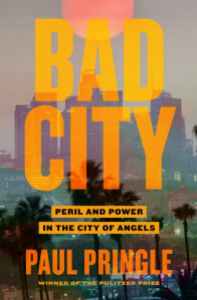 Los Angeles Times investigative reporter Paul Pringle has responded to an essay by Matthew Doig, a former Times editor who claims that Pringle falsely accused him and other top executives of slow-walking his reporting on a sex-and-drugs scandal at the University of Southern California so as not to offend an important advertiser and business partner.
Los Angeles Times investigative reporter Paul Pringle has responded to an essay by Matthew Doig, a former Times editor who claims that Pringle falsely accused him and other top executives of slow-walking his reporting on a sex-and-drugs scandal at the University of Southern California so as not to offend an important advertiser and business partner.
Pringle made his accusations in his new book, “Bad City.” The dispute is pretty complex, so you might want to read this for background and then come back. The New York Times also has a good overview (free link). Here’s part of what Pringle has to say in a rebuttal that was published by Los Angeles Magazine:
The Times fired Davan Maharaj, Marc Duvoisin and Matthew Doig after I and four other reporters complained about their handling of the story that is at the heart of “Bad City” — corruption at the University of Southern California. The firings came after an internal inquiry and were wildly popular in the Times’ newsroom. After the editors were gone, the USC reporting team continued to produce one major story after another about the school, and three of us eventually won a Pulitzer Prize for that work.
Maharaj was editor and publisher under the Times’ previous owner, the unfortunately named tronc; Duvoisin was managing editor, and Doig was assistant managing editor for investigations. Pringle also writes:
In the months leading up to the publication of the book, the three editors were given the opportunity to respond to the manuscript, including through an interview. They ultimately chose instead to retain attorneys to threaten lawsuits, with the clear intent of stopping publication of “Bad City.” Those threats similarly contained no factual challenges to my reporting.
Doig’s Medium post links to documents that make him look good but not to others that don’t, including his failed attempts to rewrite our drafts of the story, which focused on the drug-abusing and drug-trafficking dean of USC’s medical school. His rewrites were deemed unpublishable not just by the five reporters (we would have never put our bylines on them), but also by Duvoisin, who finally took the story away from him.
Duvoisin wrote his own response to Pringle’s allegations that I missed earlier. Despite Pringle’s contention that Duvoisin overruled Doig, Duvoisin’s defense parallels Doig’s, calling Pringle’s claims “entirely false.” Duvoisin continues:
The USC story was not killed; it was sent back for more reporting, which improved it immeasurably, and it was published on the front page. The reporters who worked on the story were never blocked; they were edited. They did not fight against dark newsroom corruption; they were held to high standards — and resented it. They did not work in secret. They merely thought they were working in secret, which is kind of amusing when you think about it.
Similarly, Maharaj posted a comment to Doig’s essay that begins: “Matt [Doig] did an excellent job shooting down the endless falsehoods in ‘Bad City,’ which accuses me of ‘killing’ the initial story. That is not true.”
Discover more from Media Nation
Subscribe to get the latest posts sent to your email.

1 Pingback